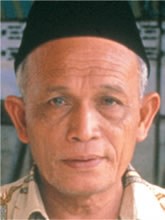Kulisusu in Indonesia

Photo Source:
Copyrighted © 2026
Anonymous All rights reserved. Used with permission |
Send Joshua Project a map of this people group.
|
| People Name: | Kulisusu |
| Country: | Indonesia |
| 10/40 Window: | Yes |
| Population: | 26,000 |
| World Population: | 26,000 |
| Primary Language: | Kulisusu |
| Primary Religion: | Islam |
| Christian Adherents: | 3.26 % |
| Evangelicals: | 3.26 % |
| Scripture: | Translation Started |
| Ministry Resources: | No |
| Jesus Film: | No |
| Audio Recordings: | Yes |
| People Cluster: | Tukangbesi of Sulawesi |
| Affinity Bloc: | Malay Peoples |
| Progress Level: |
|
Introduction / History
The Kulisusu people of Indonesia are located on the northeastern area of Buton Island, which is in the province of Southeast Sulawesi. The Kulisusu live on the narrow hilly peninsula which juts southward, separating the Koro Bay on the west from the Banda Sea on the east, an area approximately 5 km in breadth and 20 km in length. Pressures created by an expanding population are currently being eased by the availability of new land (virgin forest), both along the north coast and in the mountains and foothills surrounding Koro Bay. Although little has been written about the Kulisusu, we know they have been settled in their present location for at least the past 400 years. While they have apparently always been a small people group, they enjoyed a period of independence in the early 17th century until their capital town was sacked by force from Ternate (in North Maluku province). Not long after that, Islam was introduced into the area. Thereafter, because of the continuing threat from Ternate, the Kulisusu found it best to ally themselves as a vassal state under the neighboring Wolio people, whose sultans ruled from the southern part of Buton island. The Kulisusu language is part of a larger linguistic grouping called the Eastern Bungku-Tolaki subfamily which also includes the Koroni, Bungku, Taloki, Bahonsai, Wawonii, Mori Moronene, Padoe, Tomadino, Kodeoha, Rahambuu, Tolaki and Waru languages.
What Are Their Lives Like?
Most Kulisusu families have their own farmlands and work together in cultivating the land. They primarily cultivate cassava, corn and rice along with assorted vegetables and fruits. In addition to personal consumption, produce is also sold in the markets and the Kulisusu are known for offering low prices. Some Kulisusu are traders who travel to other islands in and around Indonesia or work on merchant ships. Kulisusu who become government employees are respected by others, because of their prestige, high salary and opportunities to improve their lives. Northern Buton has recently become its own district, which has brought more government jobs to the area. Because of the strong extended families of the Kulisusu, each working adult will share at least a part of his/her salary with the larger family. Honesty and hard work are valued among the Kulisusu people and they have an extremely low crime rate.
What Are Their Beliefs?
The Kulisusu are followers of Islam, which came into their area around the 17th century. The Islamic faith is expressed through activities such as circumcision, attending the mesjid (mosque) and fasting during the month of Ramadan. The end of Ramadan marks the beginning of unique Kulisusu celebrations. Despite their Islamic identity, their beliefs in Allah and the Qur'an (Islamic holy book) do not prevent them from having special celebrations to satisfy evil spirits, or going to a dukun (shaman) when they are sick or having difficulties.
What Are Their Needs?
Because their land is rocky, they cannot grow easily marketable plants that are well known in other areas of Sulawesi. Inexpensive medical care and medicine are needed in rural areas. Because of financial obstacles and other factors, the Kulisusu only seek medical help in cases of emergency.
Prayer Points
Pray for the Holy Spirit to show himself far more powerful than any other spirit.
Pray for signs and wonders to take place and that this would testify of the power and authority of the name of Jesus.
Pray for wisdom in discipleship with rapid multiplication of disciples and house churches.
Pray for bold, compassionate workers to be sent to them.
Pray for revival to spread through Kulisusu communities, transforming them by the love of Christ.